Former athletes building new lives
Updated: 2016-09-15 08:13
By Tang Yue(China Daily)
|
||||||||
The normal story goes like this: Athletes grow up in the State-run sports system and the very few at the top win Olympic gold medals, becoming national heroes. After retirement, most of the champions become officials in local or central governmental bodies, mostly in sports sectors.
From 1984 - the year China sent its first Olympic squad since 1949 - until the 2012 London Olympics, 222 Chinese athletes have won gold medals in eight Summer Olympics and four Winter Games. About 60 percent of them chose political career paths after retirement and the rest went on to become coaches in the local or national sports team or teachers in universities.
To name a few, Wang Nan, a four-time female Olympic table tennis gold-medalist, then 30, retired after the Beijing Olympics and became a department-level cadre in the Communist Youth League.
Meanwhile, Yang Wei, a three-time Olympic gymnastics champion who also retired after the 2008 Games, is now the vice-director of the gymnastics department of the provincial sports bureau in his home Hubei province, a more common route for elite Chinese athletes.
But the norm is slowly breaking. More retired athletes have opted to start their own businesses thanks to the booming sports industry in China.
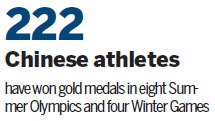
According to the General Administration of Sport, the added value of the sports industry accounted for only 0.56 percent of gross domestic product in 2013. In comparison, the figure was about 3 percent in the US the same year.
However, it is growing quickly thanks to favorable policies from the central government and the rising health awareness of an expanding middle class. As an indicator of the boom, more than 30 of the Chinese A-share listed companies are investing in the sports industry.
The sports authority estimates that the scale of the sports industry in China will be about 3 trillion yuan ($ 449 billion) by 2020, accounting for 1 percent of GDP.
According to Tan Jianxiang, a sports sociology professor at South China Normal University, the rapid growth of the sports industry offers a great opportunity for the athletes to turn their experience and fame into business success, especially for those who don't want to spend the rest of their lives in bureaucracy.
"It is not that the retired athletes are so interested in political careers. Rather, having been dedicated to training and competition since they were very young, many of them have no idea what they could do other than sports. As such, securing a job in government bodies seemed a rational choice, which is often given to them as a return for winning glory for the country," he said.
"But now they have a bigger stage because the sports industry is taking off in China and the intangible assets of the champions are of great value."
Chen Yibing is one of those catching the trend. The three-time Olympic gold-medalist turned down the offer by the Tianjin Sports Bureau after retirement in 2013 and became a sports lecturer at Beijing Normal University instead.
However, Chen found the job not challenging enough and resigned a year later, starting his own online sporting goods business. In 2015, he launched the internet application Xing Dong, which teaches body building. The application received a 12 million yuan investment and has 700,000 registered users so far.
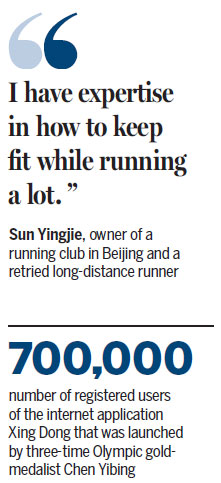
"I already ran six fitness clubs before retirement. I've been devoted to sports for more than 20 years, knowing a lot about the industry and having many friends in the circle. It is my advantage over the entrepreneurs coming from other fields," said Chen. But a start-up is never an easy job, he admits. "I now work 12 hours a day. I leave home before the baby wakes up and when I am back home, she is already asleep," said Chen, father of a 11-month-old girl.
Sun Yingjie's athletic career might not be successful as Chen's. She won the Beijing International Marathon from 2003-05. But she never made the podium at the Olympics and her best performance at the World Championship was a bronze medal.
It doesn't keep her from running one of the leading running clubs in the country though. Established by Sun and her husband Wang Chengrong, also a retried long-distance runner, in Beijing in 2014, the club now has eight branches nationwide with more than 5,000 members in total.
It came as no surprise as the number of marathon races skyrocketed in the past few years, jumping from 12 in 2010 to 134 in 2015.
"I was an athlete for so many years and didn't suffer from severe injuries. I have expertise in how to keep fit while running a lot. My husband was also an athlete and coach, which helps us win the trust from the amateur runners," said Sun.
"But it is also our weakness in a way. We spent most of the time training and are not very sociable. It is a great challenge for us to do startups," said Sun.
For many years, under the State-run sports system, the athletes were dedicated to training from their early years and received limited academic education.
As a result, for those whose success isn't good enough to win a job arranged by the government, it could be quite hard sometimes to be employed after retirement.
For example, weightlifter Zou Chunlan, despite breaking the national record in 1990, became a kitchen staff member at the Jilin provincial training base after she retried in 1993. She then worked at a local public bathhouse, giving female customers rubdowns, after leaving the training base in 2000.
In another case, Ai Dongmei, winner of the Beijing International Marathon in 1999, announced the sale of dozens of her medals in 2007 when she was unemployed after retirement.
Tan, the sports sociologist, believed the expanding sports industry will help more retired athletes secure a decent job and, hopefully, change the nation's sports system in the long run.
"With more clubs established by retired athletes, more kids will receive training in the sports clubs rather than the government-run system, just like the US," said Tan.
"On one hand, the children will have a more balanced life between study and sports, which is responsible for their future. On the other hand, only the larger pool of talent can sustain a nation's good performance at the Olympics."
Contact the writer at tangyue@chinadaily.com.cn
(China Daily 09/15/2016 page1)

 Riding on smart cycles in Nanjing city
Riding on smart cycles in Nanjing city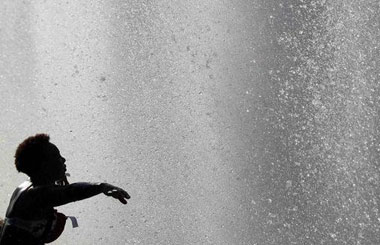
 Britain records warmest September day since 1911
Britain records warmest September day since 1911
 Island retreats you may not want to miss for holidays
Island retreats you may not want to miss for holidays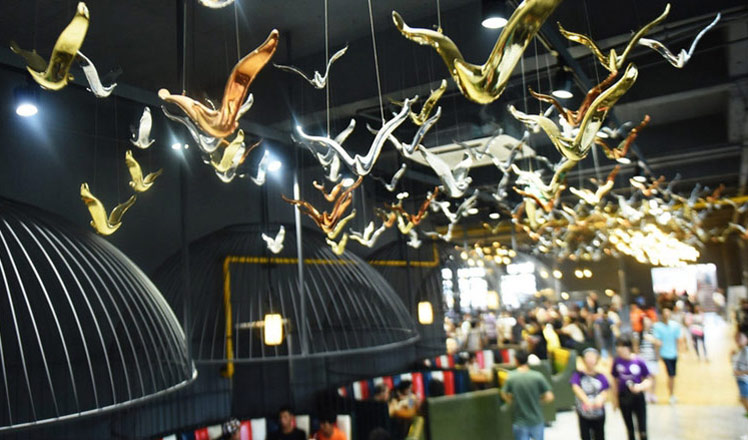
 Industrial-style canteen surprises university students
Industrial-style canteen surprises university students
 Cute animals share a bite of moon cake festival
Cute animals share a bite of moon cake festival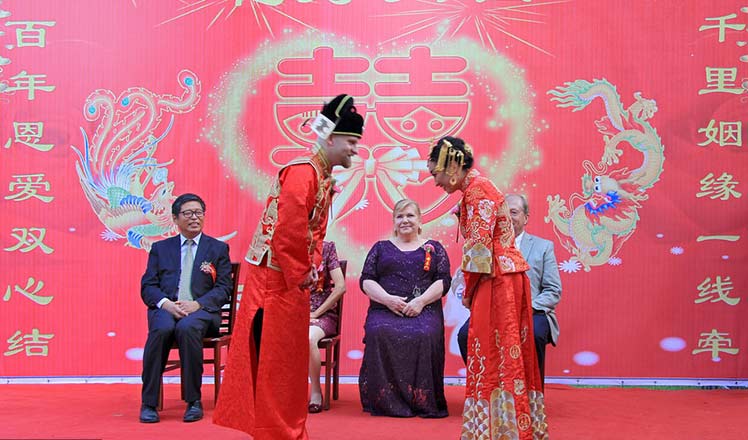
 Orphaned Chinese marries American at SOS village
Orphaned Chinese marries American at SOS village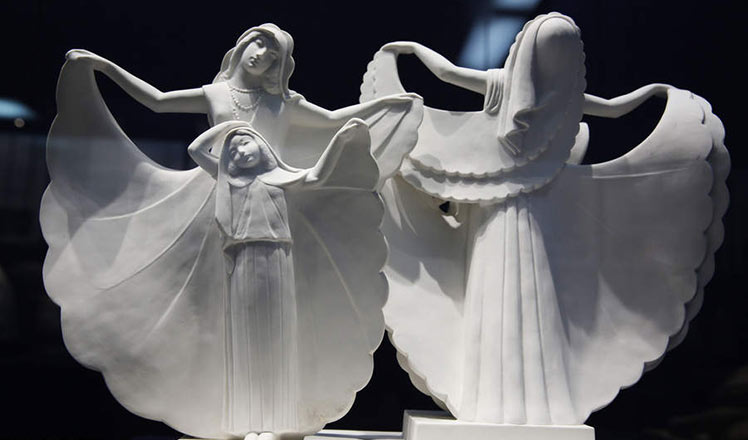
 French royal porcelains shine in Xi'an
French royal porcelains shine in Xi'an
 How to raise great kids? A case for twin girls
How to raise great kids? A case for twin girls
Most Viewed
Editor's Picks

|

|

|

|

|

|
Today's Top News
Trump outlines anti-terror plan, proposing extreme vetting for immigrants
Phelps puts spotlight on cupping
US launches airstrikes against IS targets in Libya's Sirte
Ministry slams US-Korean THAAD deployment
Two police officers shot at protest in Dallas
Abe's blame game reveals his policies failing to get results
Ending wildlife trafficking must be policy priority in Asia
Effects of supply-side reform take time to be seen
US Weekly

|

|







